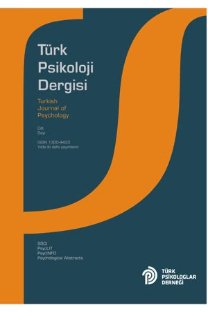Üst-biliş ve benlik saygısının bellek hakkındaki inançlar üzerindeki etkisi
Bu çalışmada, insanların bellek hakkında sahip oldukları inançların üst-bilişsel süreçlere ve benlik saygısına göre nasıl değiştiği incelenmiştir. Çalışmaya 931 kişi katılmıştır. Korelasyon ve regresyon analizleri bellek hakkında sahip olunan inançlar, üst-bilişsel süreçler ve benlik saygısı arasında anlamlı ilişkiler olduğunu göstermiştir. Farklı üst-bilişsel süreçler açısından özellikle bilişsel güven faktörünün, bellek hakkında sahip olunan inançlar açısından kritik bir önemi olduğu görülmüştür. Sonuçlar ayrıca, bellek hakkında sahip olunan inançların bilişsel güven ve benlik saygısına göre değiştiğini, yüksek bilişsel güven ve benlik saygısının bellek hakkında olumlu inançlara sahip olmada önemli belirleyiciler olduğunu göstermiştir. Araştırmanın sonuçları bellek hakkındaki inançlar, üst-biliş ve benlik saygısı ile ilgili alanyazın bağlamında tartışılmıştır.
Effect of metacognition and self-esteem on beliefs about memory
The present study investigated the relationships between beliefs about memory, metacognitive processes, and self-esteem. Data for this study was collected from 931 participants. Correlation analyses showed significant relations between beliefs and opinions about human memory, metacognitive processes, and self-esteem. In addition, regression analyses indicated that cognitive confidence was very critical metacognitive process for beliefs about memory. Also people who have positive cognitive confidence and high self-esteem had more positive beliefs about memory. The results are discussed with reference to the literature of metacognition, beliefs about memory, and self-esteem.
___
Bothwell, R. K., Deffenbacher, K. A. ve Brigham, J. C. (1987). Correlation of eyewitness accuracy and confidence: Opti-mality hypothesis revisited. Journal of Applied Psychology, 72, 691-695.Cartwright-Hatton, S. ve Wells, A. (1997). Beliefs about worry and intrusions: The Meta-Cognitions Questionnaire and its correlates. Journal of Anxiety Disorders, 11, 279-296.
Çuhadaroğlu, F. (1985). Adölesanlarda benlik saygısı. Yayımlanmamış Uzmanlık Tezi, Hacettepe Üniversitesi Tıp Fakültesi, Ankara.
Dienes, Z. ve Perner, J. (1999). A Theory of implicit and explicit knowledge. Cambridge: Cambridge Univ.Pres.
Field, A. (2009). Discovering statistics using SPSS (3. baskı). London, UK: Sage Pub.
Ihlebaek, C., Löve, T., Elilertsen, D. E. ve Magnussen, S. (2003). Memory for a staged criminal event witnessed live and on video. Memory, 11, 219-327.
Irak, M. (2008). İnsanların bellek hakkındaki inançları araştırma sonuçlarıyla tutarlı mıdır? Türk Psikoloji Dergisi, 23(62), 17-33.
Karpicke, J. D. ve Roediger, H. L. (2008). The critical importance of retrieval for learning. Science, 319, 966-968.
Koriat, A., Bjrok, R. A., Sheffer, L. ve Bar, S. K. (2004). Predicting one's own forgetting: The role of experience-based and theory-based processes. Journal of Experimental Psychology: General, 133, 643-656.
Koriat, A. (2007). Metacognition and consciousness. P.D. Zela-zo, M. Moscovitch ve E. Thompson, (Ed.), The Cambridge handbook of consciousness içinde (289-325). New York: Cambridge University Press.
Magnussen, S., Andersson, J., Cornoldi, C. ve ark. (2006). What people believe about memory. Memory, 14, 595-613.
Magnussen, S., Endedtad, T., Koriat, A. ve Helstrup, T. (2007). t» What do people believe about memory and how do they talk about memory? S. Magnussen ve T. Helstrup, (Ed.), Everyday memory içinde (5-26). New York: Psychology Press.
Nelson, T. O. ve Narens, L. (1990). Metamemory: Theoretical framework and new findings. The Psychology of Learning and Motivation, 26, 125-141.
Nilsson, L. G. ve Larsson, M. (2007). Self-referent beliefs about memory and actual performance: Relationships with age and sex. S. Magnussen ve T. Helstrup, (Ed.), Everday memory içinde (275-289). New York: Psychology Press.
Rosenberg, M. (1965). Society and the adolescent self-image. Princeton, NJ: Princeton University Press.
Sporer, S. L., Penrod, S., Read, D. ve Cutler, B. (1995). Choosing, confidence, and accuracy: A meta-analysis of the confidence accuracy relation in eyewitness identification studies. Psychological Bulletin, 118, 315-327.
Story, A. L. (1998). Self-esteem and memory for favorable and unfavorable personality feedback. Personality and Social Psychology Bulletin, 24, 51-64.
Tabchnick, B. G. ve Fidell, L. S. (2007). Using multivariate statistics (5. baskı). Belmont, CA: Thomson/Brooks/Cole.
Tafarodi, R. W. (1998). Paradoxical self-esteem and selectivity in the processing of social information. Journal of Personality and Social Psychology, 74, 1181-1196.
Tafarodi, R. W„ Marshall, T. C. ve Milne, A. B. (2003). Self esteem and memory. Journal of Personality and Social Psychology, 84(1), 29-45.
Tosun, A. ve Irak, M. (2008). Üstbiliş Ölçeği-30'un Türkçe uyarlaması, geçerliği, güvenirliği, kaygı ve obsesif-kompülsif belirtilerle ilişkisi. Türk Psikiyatri Dergisi, 19(1), 67-80.
Wei, S. ve Gang, H. (2009). An experimental research about the memory effect of self-esteem: The cognitive processing mechanism. Psychological Science (China), 32(5), 1120-1123.
Wells, A. ve Cartwright-Hatton, S. (2004). A short form of the metacognitions questionnaire: Properties of the MCQ-30. Behaviour Research and Therapy, 42, 385-396.
Wells, G. L. ve Murray, D. M. (1984). Eyewitness confidence. G. L.Wells ve E.F. Loftus, (Ed.), Eyewitness testimony: Psychological perspectives içinde (155-170). New York: Cambridge Univ. Press.
Wiersema, D. V., van der Pligt, J. ve van Harreveld, F. (2010). Motivated memory: Memory for attitude relevant information as a function of self-esteem. Social Cognition, 28(2), 219-239.
- ISSN: 1300-4433
- Yayın Aralığı: Yılda 2 Sayı
- Başlangıç: 1978
- Yayıncı: Türk Psikologlar Derneği
Sayıdaki Diğer Makaleler
Osman İYLİKCİ, SONİA AMADO, Aslı DOĞAN
Üst-biliş ve benlik saygısının bellek hakkındaki inançlar üzerindeki etkisi
Okul ortamı ve sanal ortamda meydana gelen akran zorbalığı ne ölçüde örtüşüyor?
Depresyon ve kaygının yordayıcısı olarak mizaç ve karakter boyutları
Psikolojik yardım alma niyeti: Bir model testi
NURSEL TOPKAYA, D. Yelda KAĞNICI
Okuma güçlüğü yaşayan çocuklarda çalışma belleğinin fonolojik depo açısından incelenmesi
